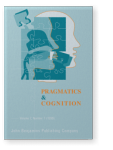Vol. 7:1 (1999) ► pp.93–145
A metacognitive model of conversational planning
The present study discusses the mechanism and formalism of conversational planning. It is argued that the planner engages in a variety of metacognition as s/he perceives, interprets, evaluates, and produces cognitive actions that require careful attention and analysis. Following Flavell's (1981) model of cognitive monitoring, a metacognitive model of conversational planning is proposed. The model consists of several cognitive and metacognitive components that are grouped into three categories: Causal Knowledge, Working Knowledge, and Conscious Experiences. Next, to elaborate the metacognitive components of the model, several examples of metacognitive variables in problem-solving situations are proposed. Then, focusing on these variables, the proposed model of conversational planning is illustrated using natural data taken from a clinical supervision session. In the last section, the relevance of the present study to pragmatics is briefly discussed with respect to mental operations involved in interpretation.
Cited by
Cited by 1 other publications
This list is based on CrossRef data as of 13 june 2024. Please note that it may not be complete. Sources presented here have been supplied by the respective publishers. Any errors therein should be reported to them.
